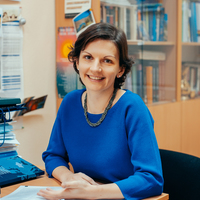
Tamara Martsenyuk is Associate Professor of Sociology, the National University of Kyiv-Mohyla Academy (Ukraine) and author of the recent book, Чому не варто боятися фемінізму.
Within the framework of the project “Fearless: They Are Making Feminism in Ukraine” (Безстрашні: вони творять фемінізм в Україні), she interviewed gender scholars in Ukraine and the diaspora. Among her interviewees were Martha Bohachevsky-Chomiak, Martha Kichorowska‐Kebalo and Marian Rubchak.
- What are the main obstacles to women’s empowerment in contemporary Ukraine?
In Ukrainian society, double standards towards gender roles still prevail. Men are expected to be, above all, “wallets” (or breadwinners). Reproductive labor (caring for children, the elderly, and people with disabilities, and also maintaining the household – preparing food, cleaning, buying food, etc.) is predominantly done by women and explained stereotypically as women’s “traditional duty.” Ukrainian women are well educated and in general are actively involved in the labor market, yet they are excluded from high positions of political decision-making. Indeed, Ukraine is among the countries with the lowest percentage of women in top-politics – only 12 percent in the national parliament.
- What has the incumbent government done since 2014 to advance gender equality in Ukraine?
Major achievements are related to women’s labor rights in the military. The sociological research “’Invisible Battalion’: Women’s Participation in ATO Military Operations” (2015) found that the Armed Forces of Ukraine, just like the job market in general, manifest vertical and horizontal gender segregation. The list of combat positions for servicewomen was considerably broadened, enlisted to the military service by contract: now, this list is increased by more than 100 combat military vocations. In general, the topic of women’s access to the Armed Forces became a part of the political agenda. The Equal Opportunities Inter-factional Caucus is one of the actors advancing it. The Ministry of Defense of Ukraine created the working group «Women, peace, security», which is actively working on changing the attitudes towards women in the army. On September 6, 2018, the Law of Ukraine «On Amendments to some laws of Ukraine on providing equal rights and opportunities of women and men during active service in the Armed Forces of Ukraine and other military institutions» was adopted. The law, in particular, specified that women perform their military service on equal grounds with men, with the exception of the cases specified in the legislation on protection of motherhood and childhood, as well as banned sex-based discrimination. This includes both enlistment of volunteers (based on contract) and conscription, active service, reserve service, performance of military service in reserve, and observance of the military registration regulations.
- What is the impact of the EuroMaidan and the war in Ukraine on the development of gender studies at Ukrainian universities?
The most important change manifested itself in public discussions of sexual harassment at Ukrainian universities. This public discourse was inspired by the online (hashtag) campaign #ЯНеБоюсьСказати (#IAmNotAfraidToSayIt) that started in summer 2016. Clearly, the #IAmNotAfraidToSayIt campaign is a collective women’s action launched in order to draw attention to the problem of gender-based violence in general and sexual violence in particular. In early 2019, female students at one of Ukraine’s top universities, Taras Shevchenko National University, spoke out about being serially sexually harassed by a faculty member; the case has been widely discussed both inside and outside the university, stimulating a broader public discussion about sexual harassment in Ukraine’s universities. Also, at the end of 2018 the National University of Kyiv-Mohyla Academy became the first Ukrainian university to adopt a formal policy of preventing and combating sexual harassment. In January 2019, the university set up a special committee to enforce the new policy.
- How do Ukrainian women feel about celebrating the International Women’s Day?
At the end of 2018, the Kyiv International Institute of Sociology (KIIS) conducted a nationally representative survey about mass attitudes towards public holidays. International Women’s Day is favorite and important for 50 percent of women and 34 percent of men. There is a regional cleavage in the attitudes towards this holiday. International Women`s Day is the least popular among the residents of western Ukraine (17 percent) and the most popular in eastern Ukraine (60 percent). In central and southern parts of Ukraine it is favored by 50-52 percent of the population.
Since the Soviet times, International Women’s Day lost its meaning as a day of women’s struggle for their rights and became a holiday associated with “flowers and beautiful women.” At the same time, over the past few years, more women have participated in the annual Women’s March organized in Kyiv, Lviv, Kharkiv, and other Ukrainian cities to raise public awareness of gender discrimination and sexism. This topic has been debated in the Ukrainian media.
- What do you see as the most promising areas for cooperation between women in Ukraine and the diaspora in the United States?
World Federation of Ukrainian Women’s Organizations (WFUWO) is a very positive example of such cooperation. WFUWO organizes events in collaboration with women’s NGOs from Ukraine during annual Sessions of the UN Commission on the Status of Women, held at the UN Headquarters in New York City. For example, during my Fulbright 2017-2018 year in the United States, I made a presentation, titled “The Role of Women Journalists in Promoting Gender Equality,” at the NGO Forum Parallel Event “Women Journalists as Human Rights Defenders in Ukraine,” organized by WFUWO and held at the UN headquarters during the 62nd Commission on the Status of Women.
It is also important to pay attention to the problem of gender-based violence (domestic violence, sexual violence etc.), which is a global problem, and support the campaign “16 Days of Activism against Gender-based Violence.” I am grateful for the opportunity to give a talk, “The Role of Men in Fighting Gender-Based Violence,” in support of the above-mentioned campaign on December 9, 2017, jointly organized by the World Federation of Ukrainian Women’s Organizations and the Shevchenko Scientific Society in the United States.
